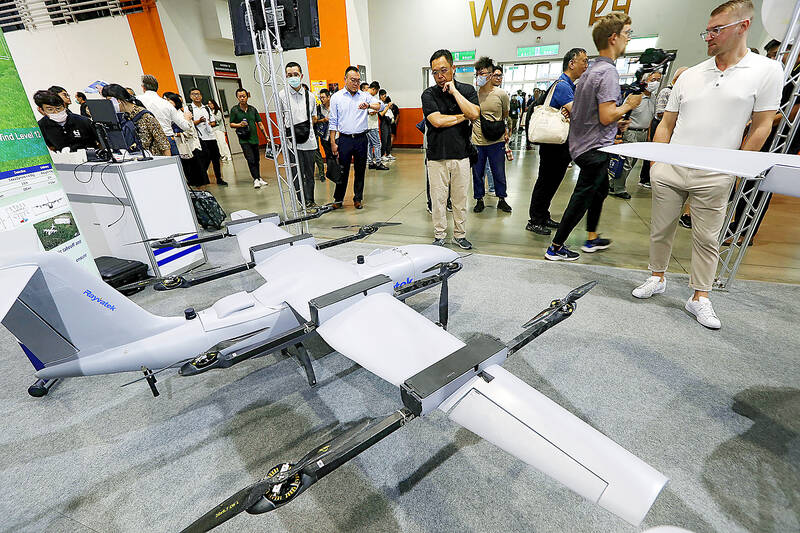Indian start-ups in the space industry showcased their innovations at an aerospace and defense technology exhibition that opened in Taipei on Thursday, with some seeking opportunities to collaborate with Taiwanese partners in areas such as defense and intelligence.
Among the five Indian start-ups participating in this year’s Taipei Aerospace and Defense Technology Exhibition, two of them — Kepler Aerospace and Insight360.ai — are highlighting defense-oriented intelligence.
Insight360.ai provides “geospatial intelligence for the defense forces” and has the capability to “capture images of military bases, using satellites,” the company’s CEO R. Om Prakash said at the expo.

Photo: Chiang Ying-ying, AP
“Then we analyze the patterns, how the troops are moving, and what’s the battlefield condition,” Prakash said.
Using artificial intelligence (AI) that it has developed, the company can scan thousands of locations in satellite images and provide intelligence to military forces, he said.
“During disaster relief or any kind of threat that comes to Taiwan, we can provide frequent satellite imagery and information,” he added.
On the question of potential collaboration with Taiwanese partners, Prakash said that his company not only delivers intelligence directly to end users, but also offers AI-enhanced wargames that “basically help train the military forces to be prepared for all kinds of situations.”
Those two services are already “in actual application,” he said, but he declined to provide details, citing client confidentiality and operational security.
As Insight360.ai does not have satellites, it sources imagery from hundreds of satellites operated by partners based in countries like the US and India, Prakash said.
However, the company has “no Chinese satellites and no Chinese partners,” he added.
Kepler Aerospace CEO Navneet Singh said his company builds its own satellites and provides “intelligence from space” for supports in areas such as national security and fisheries protection.
“We can offer a lot of detection services to strengthen Taiwanese stakeholders,” Singh said, citing possible uses such as detecting fishing vessels in Taiwan waters and tracking “illegal aircraft that can enter Taiwanese airspace.”
Kepler Aerospace has three satellites currently in orbit that are operating on its own systems, and it expects to launch six more “in a couple of years,” he said.
“We would also like to deploy the satellites that we have under the Taiwanese flag through our partners in Taiwan,” Singh said.
The company would help its Taiwanese partners to provide “sovereign intelligence-gathering capabilities to Taiwanese stakeholders,” he added.
Kepler Aerospace and Insight360.ai were scheduled to sign MOUs with several Taiwanese partners yesterday, the second day of the three-day exhibition.
India’s space industry has demonstrated strong growth in recent years, with key advantages such as a rapidly expanding industry scale and a well-developed satellite and launch system, the Industrial Technology Research Institute (ITRI) said.
It is the first time that Indian space enterprises are participating “as a team at scale” in the biennial exhibition, the ITRI said.
The strength of Indian companies in launch services and integrated applications can “directly complement areas where Taiwan is currently less developed,” the ITRI said.
Meanwhile, “Taiwan’s expertise in precision electronics, high-reliability manufacturing, key components, and advanced composite materials can enhance India’s system integration capabilities,” the institute said.

Taiwan’s foreign exchange reserves hit a record high at the end of last month, surpassing the US$600 billion mark for the first time, the central bank said yesterday. Last month, the country’s foreign exchange reserves rose US$5.51 billion from a month earlier to reach US$602.94 billion due to an increase in returns from the central bank’s portfolio management, the movement of other foreign currencies in the portfolio against the US dollar and the bank’s efforts to smooth the volatility of the New Taiwan dollar. Department of Foreign Exchange Director-General Eugene Tsai (蔡炯民)said a rate cut cycle launched by the US Federal Reserve

Handset camera lens maker Largan Precision Co (大立光) on Sunday reported a 6.71 percent year-on-year decline in revenue for the third quarter, despite revenue last month hitting the highest level in 11 months. Third-quarter revenue was NT$17.68 billion (US$581.2 million), compared with NT$18.95 billion a year earlier, the company said in a statement. The figure was in line with Yuanta Securities Investment Consulting Co’s (元大投顧) forecast of NT$17.9 billion, but missed the market consensus estimate of NT$18.97 billion. The third-quarter revenue was a 51.44 percent increase from NT$11.67 billion in the second quarter, as the quarter is usually the peak

The US government on Wednesday sanctioned more than two dozen companies in China, Turkey and the United Arab Emirates, including offshoots of a US chip firm, accusing the businesses of providing illicit support to Iran’s military or proxies. The US Department of Commerce included two subsidiaries of US-based chip distributor Arrow Electronics Inc (艾睿電子) on its so-called entity list published on the federal register for facilitating purchases by Iran’s proxies of US tech. Arrow spokesman John Hourigan said that the subsidiaries have been operating in full compliance with US export control regulations and his company is discussing with the US Bureau of

Pegatron Corp (和碩), a key assembler of Apple Inc’s iPhones, on Thursday reported a 12.3 percent year-on-year decline in revenue for last quarter to NT$257.86 billion (US$8.44 billion), but it expects revenue to improve in the second half on traditional holiday demand. The fourth quarter is usually the peak season for its communications products, a company official said on condition of anonymity. As Apple released its new iPhone 17 series early last month, sales in the communications segment rose sequentially last month, the official said. Shipments to Apple have been stable and in line with earlier expectations, they said. Pegatron shipped 2.4 million notebook